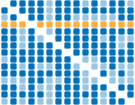Shelley, Percy Bysshe: Ode an den Westwind (Ode to the West Wind Német nyelven)
Ode to the West Wind (Angol)I.
O Wild West Wind, thou breath of Autumn’s being, Thou, from whose unseen presence the leaves dead Are driven, like ghosts from an enchanter fleeing,
Yellow, and black, and pale, and hectic red, Pestilence-stricken multitudes! O thou, Who chariotest to their dark wintry bed
The wingèd seeds, where they lie cold and low, Each like a corpse within its grave, until Thine azure sister of the Spring shall blow
Her clarion o’er the dreaming earth, and fill (Driving sweet buds like flocks to feed in air) With living hues and odours plain and hill;
Wild Spirit, which art moving everywhere; Destroyer and preserver; hear, O hear!
II.
Thou on whose stream, ’mid the steep sky’s commotion, Loose clouds like earth’s decaying leaves are shed, Shook form the tangled boughs of Heaven and Ocean,
Angels of rain and lightning: there are spread On the blue surface of thine aery surge, Like the bright hair uplifted from the head
Of some fierce Maenad, even from the dim verge Of the horizon to the zenith’s height, The locks of the approaching storm. Thou dirge
Of the dying year, to which this closing night Will be the dome of a vast sepulchre, Vaulted with all thy congregated might
Of vapours, from whose solid atmosphere Black rain, and fire, and hail will burst: hear!
III.
Thou who didst waken from his summer dreams The blue Mediterranean, where he lay, Lulled by the coil of his cristàlline streams,
Beside a pumice isle in Baiae’s bay, And saw in sleep old palaces and towers Quivering within the wave’s intenser day,
All overgrown with azure moss and flowers So sweet, the sense faints picturing them! Thou For whose path the Atlantic’s level powers
Cleave themselves into chasms, while far below The sea-blooms and the oozy woods which wear The sapless foliage of the ocean, know
Thy voice, and suddenly grow gray with fear, And tremble and despoil themselves: O hear!
IV.
If I were a dead leaf thou mightest bear; If I were a swift cloud to fly with thee; A wave to pant beneath thy power, and share
The impulse of thy strength, only less free Than thou, O uncontrollable! if even I were as in my boyhood, and could be
The comrade of thy wanderings over Heaven, As then, when to outstrip thy skiey speed Scarce seemed a vision – I would ne’er have striven
As thus with thee in prayer in my sore need. O! lift me as a wave, a leaf, a cloud! I fall upon the thorns of life! I bleed!
A heavy weight of hours has chained and bowed One too like thee – tameless, and swift, and proud.
V.
Make me thy lyre, even as the forest is: What if my leaves are falling like its own! The tumult of thy mighty harmonies
Will take from both a deep, autumnal tone, Sweet though in sadness. Be thou, Spirit fierce, My spirit! Be thou me, impetuous one!
Drive my dead thoughts over the universe Like withered leaves to quicken a new birth! And, by the incantation of this verse,
Scatter, as from an unextinguished hearth Ashes and sparks, my words among mankind! Be through my lips to unawakened earth
The trumpet of a prophecy! O, Wind, If Winter comes, can Spring be far behind?
|
Ode an den Westwind (Német)1.
|




